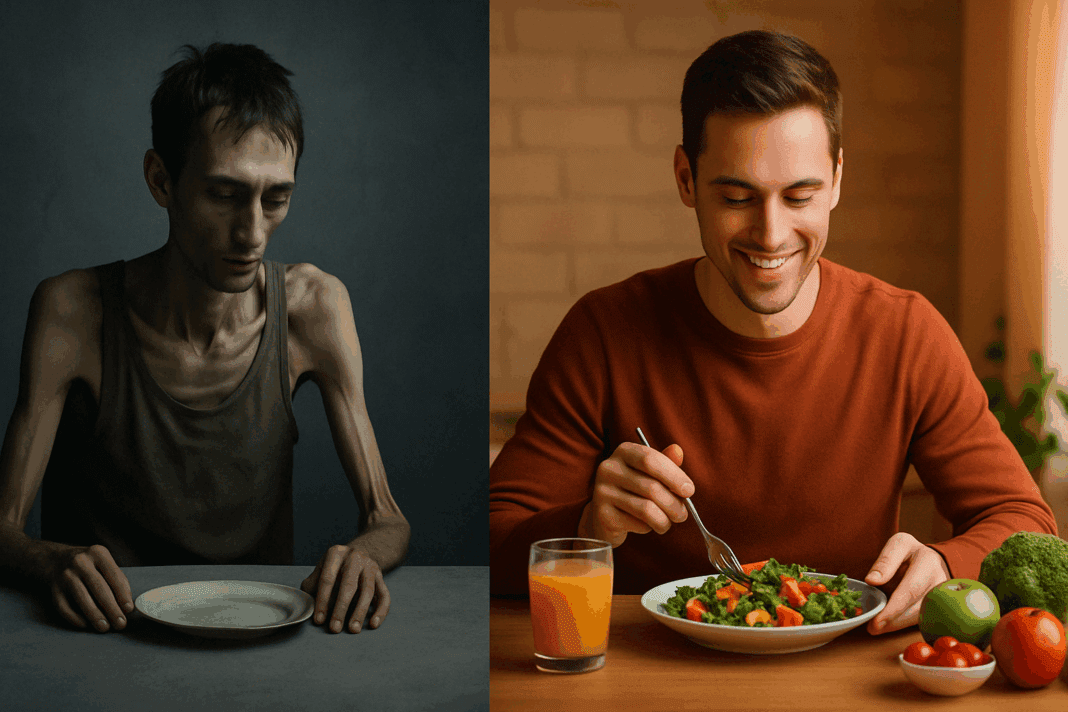Fasting, skipping meals, and restrictive dieting have become increasingly popular in modern culture as quick fixes for weight loss. The question that often arises is: can not eating make you lose weight? The short answer is yes—but the more important question is whether this method is healthy, sustainable, or safe in the long term. As people search for fast ways to shed pounds, understanding the actual impact of not eating enough to lose weight becomes vital for protecting both physical and mental well-being. Despite common assumptions, the relationship between food intake and fat loss is far more nuanced than simply reducing calories.
You may also like: How to Stop Emotional Eating and Regain Control: Mindful Nutrition Strategies That Support a Healthier Lifestyle
Experts emphasize that while caloric restriction does lead to weight loss, the method and extent of restriction significantly affect outcomes. Starving the body may initially result in some weight reduction, but the long-term consequences often outweigh the benefits. Scientific evidence shows that extreme caloric deficits can negatively affect metabolism, hormone balance, muscle mass, and mental clarity. With this in mind, exploring whether skipping meals or eating significantly less is a safe and sustainable strategy deserves a closer look.
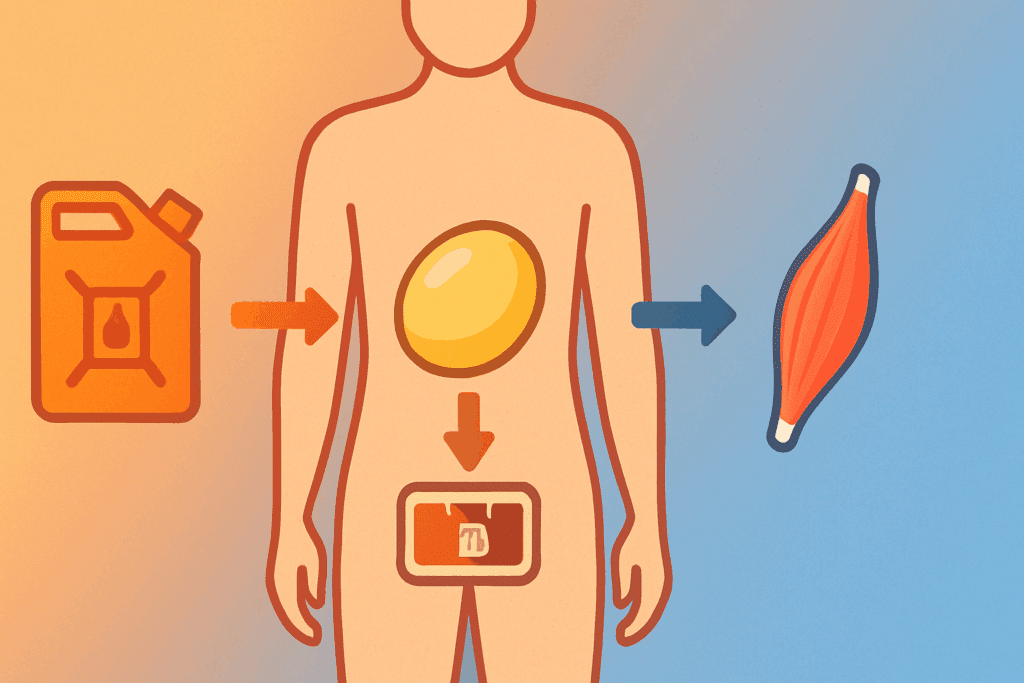
Understanding the Physiology of Weight Loss
Weight loss occurs when the body expends more energy than it receives through food. This energy imbalance, commonly referred to as a calorie deficit, forces the body to utilize stored energy—primarily from fat and glycogen reserves—to meet its metabolic needs. In this context, it seems intuitive that not eating would accelerate weight loss. But can you lose weight by not eating in a healthy way? That depends entirely on how the body responds to prolonged caloric deprivation.
When food intake drops significantly, the body initially uses glycogen stores for energy, which also causes water loss. This explains the rapid weight loss many people notice in the first few days of extreme dieting. However, if food restriction continues, the body enters a starvation mode, slowing the metabolic rate to conserve energy. At this point, lean muscle mass may begin to break down for fuel, compromising strength and overall health. This counterproductive outcome illustrates why not eating enough to lose weight can backfire.
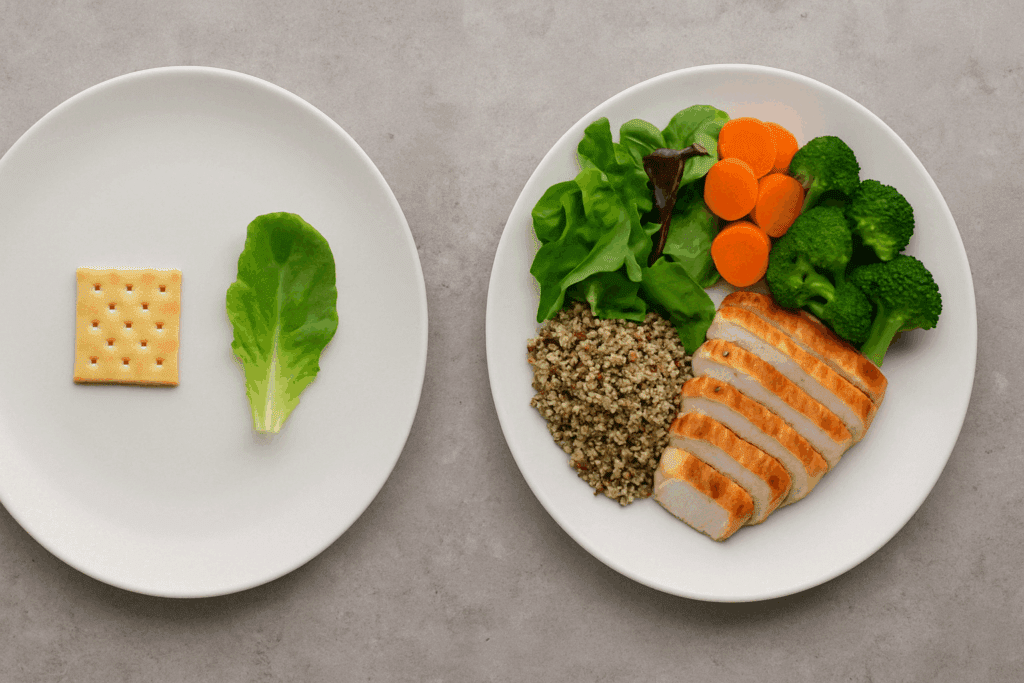
Can You Lose Weight from Not Eating Much?
It’s true that reducing food intake can create a calorie deficit, and therefore cause weight loss. Yet the question remains: can you lose weight from not eating much without compromising your health? Moderation is key. Controlled caloric reduction under the supervision of a healthcare provider or dietitian can support gradual and healthy weight loss. However, extreme forms of restriction often lack essential nutrients, weaken immune function, and harm organ systems over time.
Research consistently shows that diets severely lacking in calories and nutrients are unsustainable. While it’s possible to lose weight by eating less, the goal should be to preserve lean body mass and prioritize nutrient-dense foods. When individuals ask, “Will eating less cause weight loss?” the answer is yes—but the quality of what you eat, not just the quantity, plays a critical role. A diet filled with whole foods, fiber, and lean proteins is far more effective for long-term weight management than simply slashing calories.
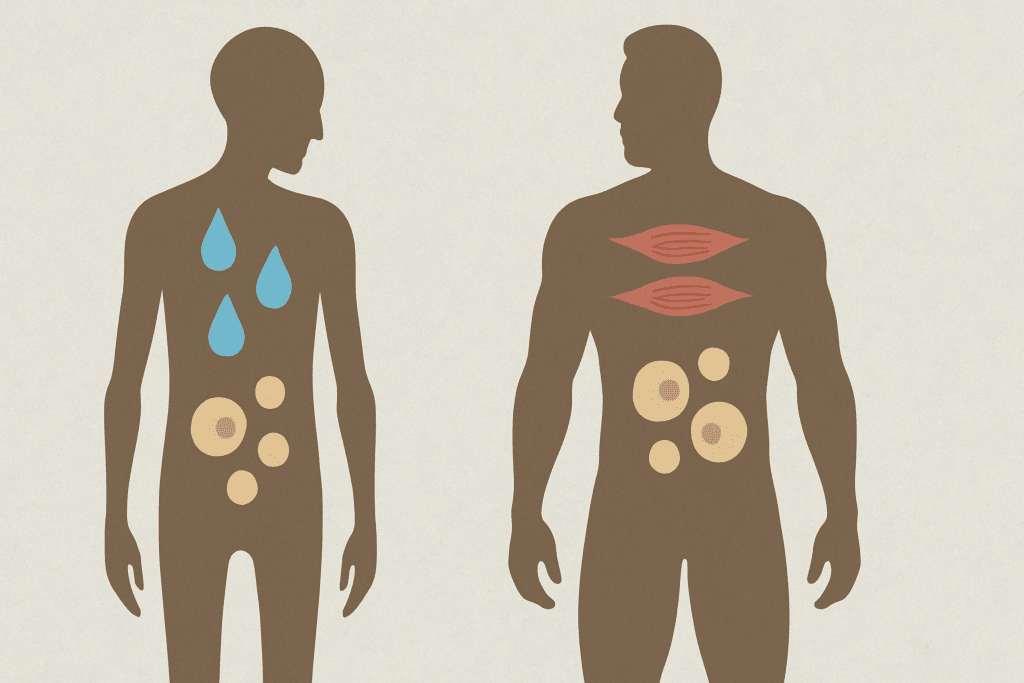
Does Not Eating Lose Weight in a Lasting Way?
One of the most pressing concerns about meal skipping and severe restriction is whether the weight loss achieved is sustainable. In most cases, the answer is no. While initial results may seem promising, the body adapts quickly. After periods of restriction, many people experience a phenomenon known as metabolic adaptation, where the body conserves energy more efficiently and burns fewer calories at rest. This makes it increasingly difficult to continue losing weight and can even lead to regaining lost weight.
The body is designed for survival. When energy intake drops drastically, stress hormones like cortisol increase, and hunger hormones like ghrelin rise, prompting intense cravings and overeating once food becomes available again. This cycle of restriction followed by binging not only undermines health but can also lead to disordered eating patterns. So while not eating can make you skinny temporarily, it often leads to rebound weight gain and metabolic instability.

Will Not Eating Help Me Lose Fat or Just Water and Muscle?
Fat loss is often the goal of dieting, but without proper nutrition and a structured plan, it can be difficult to lose only fat. In fact, many people who drastically cut calories find themselves losing water weight and muscle mass instead of fat. This is especially true when diets are low in protein or when physical activity is absent. As a result, the scale might show lower numbers, but the body composition—the ratio of fat to lean mass—may actually worsen.
Experts caution that when people ask, “Will not eating help me lose fat?” the answer is not straightforward. Without adequate protein, exercise, and caloric balance, fat loss is minimal compared to other types of tissue loss. Preserving muscle while losing fat requires a careful balance of nutrition and physical activity. Weight lost through starvation is often not fat, and this distinction is essential for understanding the real outcomes of extreme diets.
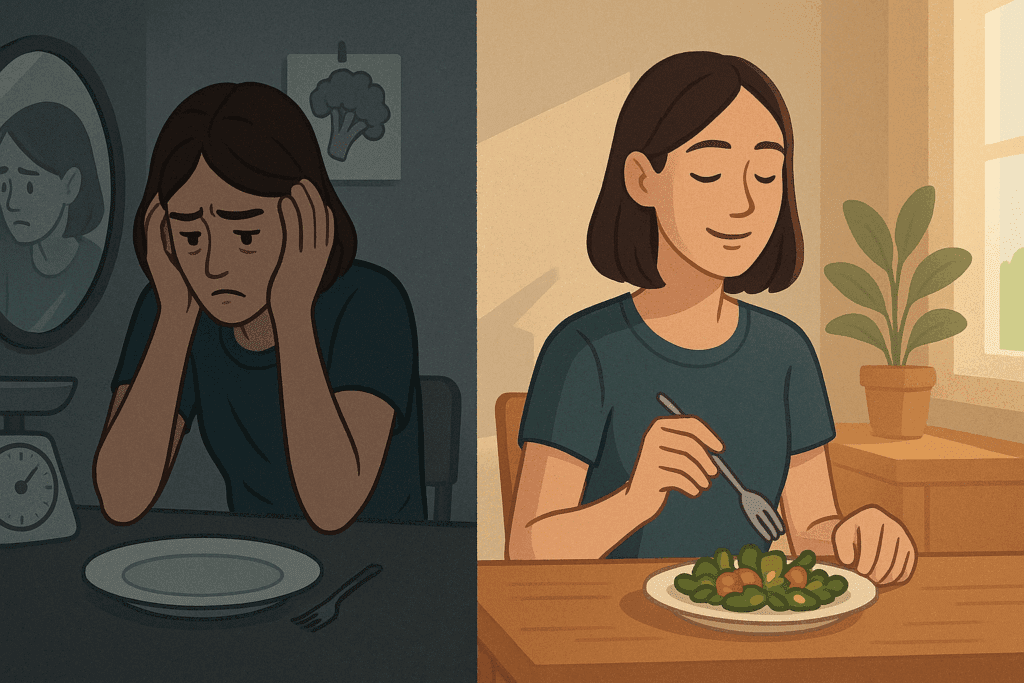
If You Starve, Do You Truly Become Thin?
The romanticized idea that starvation leads to long-term thinness is deeply flawed and medically dangerous. While temporary skinniness can occur through fasting or starvation, the body eventually fights back. Studies show that individuals who follow very low-calorie diets experience a significant drop in resting metabolic rate. Once normal eating resumes, the body tends to store more fat in preparation for future deprivation.
So when people ask, “If you starve do you truly become thin?” the real answer lies in understanding body composition and metabolic adaptation. Chronic under-eating doesn’t create a healthy or fit body; it creates a stressed, nutrient-deprived system that resists fat loss over time. True wellness comes from nourishing the body adequately, not from depriving it.
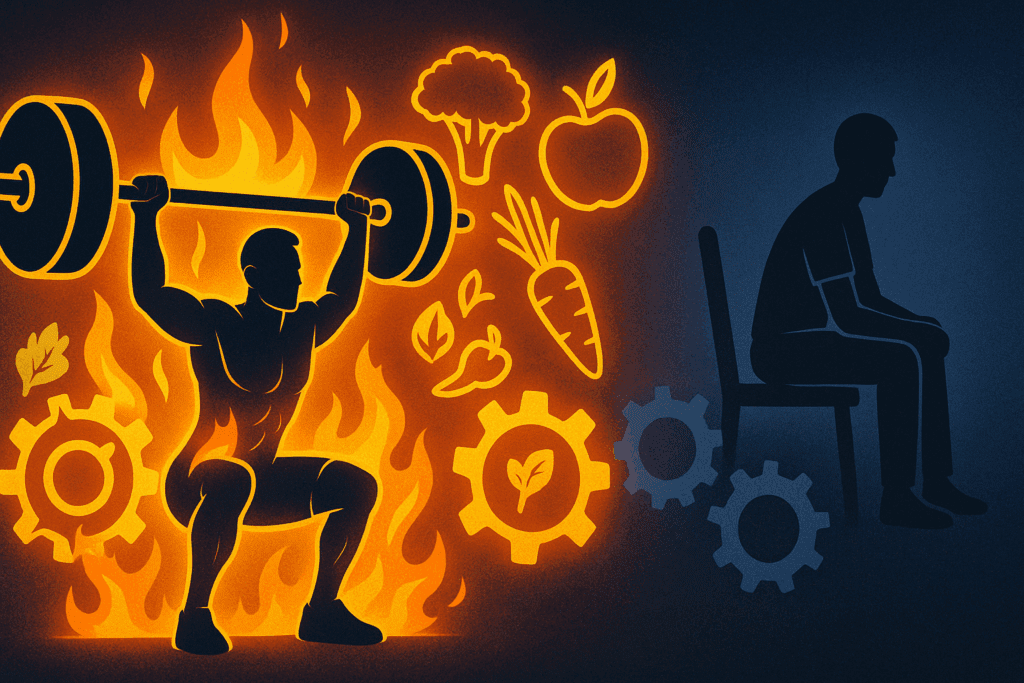
Not Eating for a Day: Does It Lead to Weight Loss?
Intermittent fasting has brought renewed interest in the concept of not eating for extended periods. Skipping meals or going an entire day without food may lead to a temporary drop in weight, but that drop is usually water weight or undigested food. When people ask whether you can not eat for a day and lose weight, the answer is technically yes—but that weight is unlikely to reflect true fat loss.
Fasting for short periods might offer metabolic benefits when done under medical supervision, but relying on it as a weight-loss method often leads to compensatory eating the next day. Moreover, repeated one-day fasts can disrupt hormone regulation and impair physical performance. So while skipping meals might produce a scale drop, it is not a substitute for a consistent, balanced approach to nutrition and lifestyle change.
Does Eating Less Cause Weight Loss in a Healthy Way?
There is no doubt that a reduction in food intake can result in weight loss. But the context, balance, and method are critical. When individuals ask, “Does eating less cause weight loss in a healthy way?” they are actually asking whether they can create a calorie deficit without harming their body. And the answer is yes—but only when the plan emphasizes nutrient quality, satiety, and sustainability.
Health experts often recommend reducing portion sizes, increasing the intake of fiber and protein, and avoiding processed foods to create a manageable calorie deficit. This kind of mindful eating can support lasting weight loss while preserving muscle mass, regulating blood sugar, and maintaining energy levels. Eating less doesn’t have to mean deprivation; it can mean eating smarter.
Can Not Eating Make You Skinny, or Just Malnourished?
There’s a stark difference between being thin and being healthy. When people pursue skinniness through restrictive eating, they risk falling into a state of malnourishment. Deficiencies in essential nutrients such as iron, B vitamins, omega-3 fatty acids, and amino acids can have widespread effects, from hair loss and fatigue to weakened immunity and cognitive decline.
When people ask, “Can not eating make you skinny?” they may be seeking a shortcut, but the long-term implications of such a choice are often overlooked. Malnutrition from inadequate food intake affects every system in the body. Sustainable leanness must come from a foundation of nourishment, not restriction. A healthy body weight is not achieved through starvation but through balance, consistency, and care.
Not Eating Enough to Lose Weight: Where the Line Gets Blurry
The line between eating less and eating too little is often difficult to define, especially in diet culture. While reducing calories can be an effective part of a weight loss strategy, eating too little creates significant risks. Nutrient deficiencies, loss of menstrual function in women, bone density decline, and even heart complications can occur when caloric intake drops too low for too long.
So when people ask about not eating enough to lose weight, it is important to question not only the caloric number but also the quality and diversity of the diet. The goal should be a gradual and sustainable weight loss of one to two pounds per week, which typically requires a deficit of 500 to 1,000 calories per day—not starvation. Being aware of the signs of under-eating, such as chronic fatigue, mood swings, or irregular digestion, can help individuals assess whether their approach is truly serving their health.
The Psychological Toll of Extreme Food Restriction
Food is not just fuel—it’s also deeply connected to emotional and psychological well-being. Extreme restriction, especially when driven by a desire to become thin, can lead to anxiety, depression, irritability, and a disordered relationship with food. When people chronically ask, “Can not eating make you lose weight?” they may be internalizing harmful societal messages equating thinness with worth.
Research in the field of eating disorders underscores the emotional toll of starvation. Chronic dieters often experience feelings of guilt, shame, and failure when they inevitably eat again. Over time, these cycles damage self-esteem and can lead to binge-eating, bulimia, or anorexia nervosa. It is essential to prioritize mental health when pursuing physical changes, recognizing that food is not the enemy—it is a tool for healing, energy, and resilience.
The Role of Metabolism and Muscle in Sustainable Weight Loss
Metabolism plays a central role in determining how the body uses energy. Muscle tissue is metabolically active, meaning it burns more calories than fat even at rest. When individuals lose weight by not eating, they risk losing muscle mass, which can further reduce metabolic rate. This explains why people who starve themselves often struggle to maintain weight loss.
Building and preserving muscle through strength training and adequate protein intake is key to sustainable fat loss. Even during periods of caloric reduction, resistance exercise can help retain lean mass and support hormonal health. Nutrition experts often recommend prioritizing protein-rich meals, spreading them evenly throughout the day, to maximize muscle preservation during weight loss.
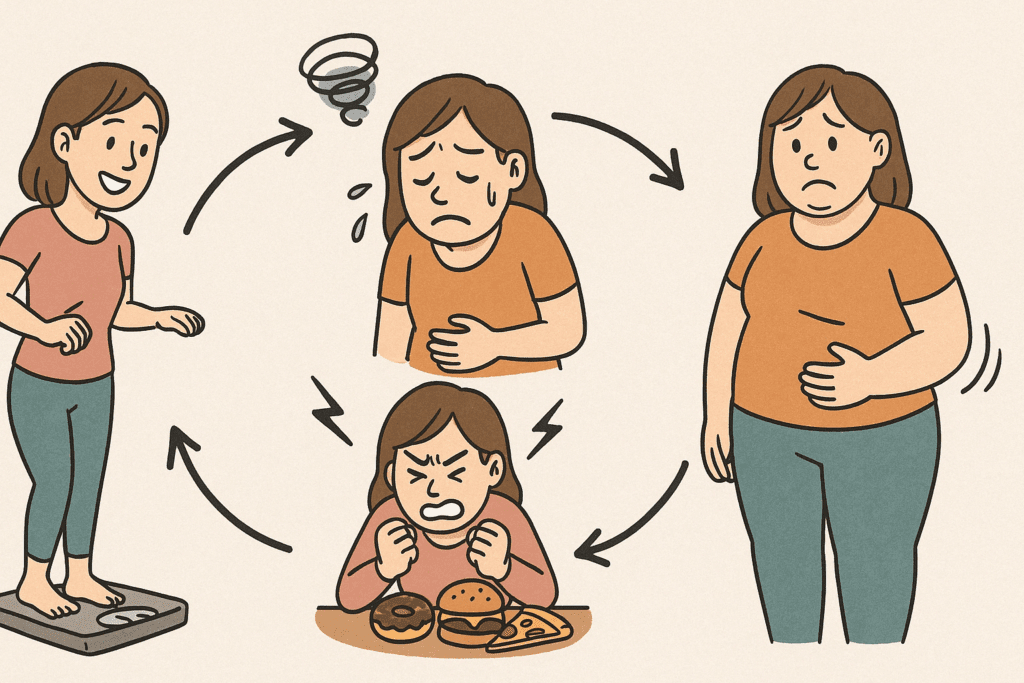
Does Not Eating Lose Weight in the Long Run?
While not eating may result in short-term weight loss, the long-term outlook is bleak without proper planning. Many studies have shown that individuals who use extreme dieting methods often regain the weight, and sometimes even more. This pattern, known as weight cycling or yo-yo dieting, can harm cardiovascular health and increase the risk of type 2 diabetes.
Instead of asking, “Does not eating lose weight?” it may be more helpful to ask, “What is the most sustainable way to manage weight and feel good in my body?” Research supports strategies such as mindful eating, regular physical activity, sleep hygiene, and stress management as more effective long-term tools for weight maintenance.
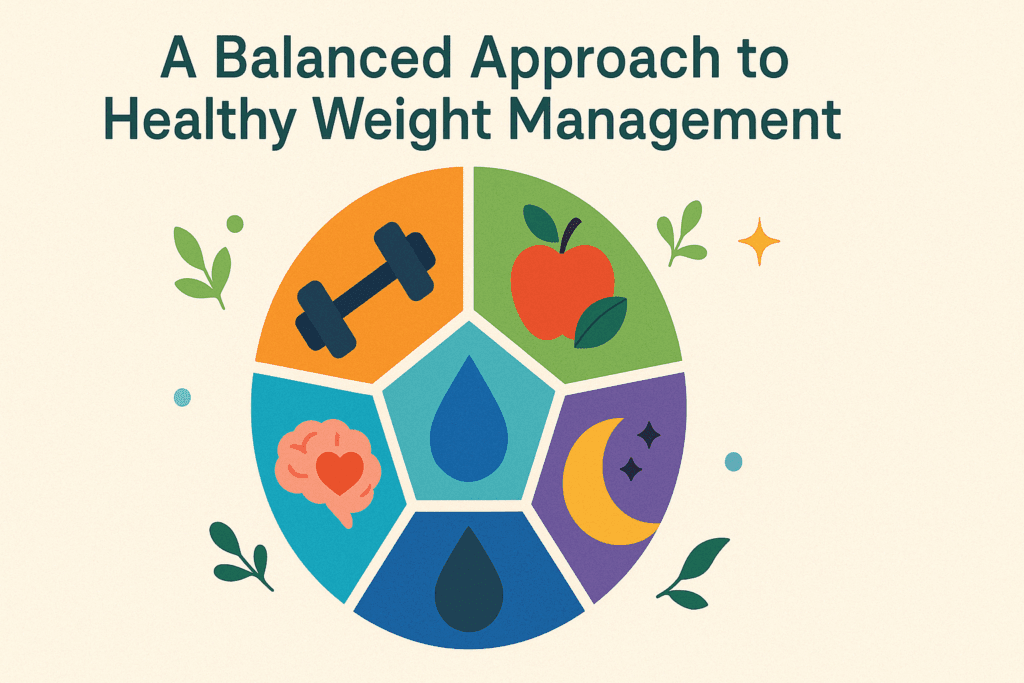
A Balanced Approach to Healthy Weight Management
Sustainable weight loss is not about eliminating meals or starving the body. It’s about creating an environment where the body can thrive while gradually adjusting its composition. Mindful eating, which emphasizes awareness, satiety cues, and emotional regulation, has been shown to reduce overeating and improve body satisfaction.
Incorporating whole foods, maintaining hydration, and building a positive relationship with movement are all key components of a healthy lifestyle. Rather than focusing on rapid results, individuals should aim for consistent habits that align with their values and health goals. Education, support, and patience are crucial in this journey.
Reframing the Question: What Do We Really Want From Weight Loss?
At the heart of the question “Can not eating make you lose weight?” lies a deeper inquiry about self-image, identity, and worth. In a culture that often glorifies thinness, it’s important to separate aesthetic goals from genuine health. Being “skinny” is not synonymous with being healthy or happy.
Health professionals advocate for redefining success to include strength, energy, emotional well-being, and body confidence. Rather than chasing a number on the scale, people benefit more from cultivating habits that promote vitality and resilience. Food should be a source of nourishment and joy, not fear or punishment.
Frequently Asked Questions (FAQ)
What are the long-term psychological effects of using food restriction as a weight-loss strategy?
Severe food restriction, particularly when practiced for extended periods, can have profound psychological consequences. Individuals who attempt to lose weight through prolonged under-eating often develop obsessive thoughts around food, experience heightened anxiety during meals, and may isolate themselves socially to avoid eating scenarios. While some might initially feel a sense of control, this quickly devolves into guilt and shame cycles that are emotionally draining. Although many ask, “can not eating make you skinny,” the deeper issue becomes the toll it takes on mental health, which is often not reversible without professional support. In clinical settings, disordered eating patterns that stem from extreme restriction are linked to higher rates of depression and anxiety, suggesting that emotional well-being must be prioritized alongside physical goals.
How does the body compensate when you consistently don’t eat enough?
When you’re not eating enough to lose weight, your body doesn’t just passively allow fat to melt away. Instead, it enacts survival mechanisms. One of the first compensations is a reduction in basal metabolic rate, which slows energy expenditure to preserve fat stores. Additionally, hormonal changes, such as increased cortisol and ghrelin, encourage fat storage and stimulate appetite. This biological defense makes it much harder to maintain fat loss, even if initial results make it appear that will not eating help me lose fat. The result is often an unsustainable pattern where you plateau despite continued restriction, leading to physical fatigue and frustration.
Is it true that some people stay thin by eating very little every day?
While it may seem that some people maintain a low body weight through minimal food intake, genetics, metabolic variability, and activity levels play a larger role than many realize. The perception that you can lose weight from not eating much oversimplifies the reality of human metabolism. In many cases, individuals who appear effortlessly thin are actually consuming enough calories to support their needs but are highly active or genetically predisposed to leanness. Trying to replicate their habits without understanding their physiology can backfire, especially if you assume that not eating enough to lose weight will produce the same result. Sustained restriction can cause fatigue, micronutrient deficiencies, and even impair brain function, making it an unsound model to follow.
Can intermittent fasting help you lose fat without starving yourself?
Intermittent fasting (IF) is often positioned as a more balanced alternative to chronic calorie restriction. Structured IF methods like 16:8 or 5:2 allow windows for normal eating while still achieving periods of caloric deficit. In this context, questions like “will u lose weight by not eating?” become more nuanced. IF might answer this question with a “yes,” but not by eliminating food altogether—rather, by controlling timing and quality. Unlike starvation, IF encourages nutrient-dense meals during feeding windows and may support hormonal balance. However, success with intermittent fasting still depends on individual factors such as stress response, sleep quality, and physical activity levels.
What role does muscle mass play in how the body responds to eating less?
Muscle mass is a major determinant of metabolic health. When individuals drastically reduce calorie intake without resistance training or sufficient protein, they lose muscle alongside fat. This muscle loss can slow the metabolism and increase the risk of fat regain, even if does eating less cause weight loss in the short term. For sustainable weight loss, it is essential to preserve lean tissue. Maintaining or increasing muscle mass helps create a healthy calorie burn baseline and improves insulin sensitivity. So while eating less may cause weight loss initially, the composition of that weight loss matters greatly for long-term success.
Can not eating for short periods actually benefit metabolism?
While extended starvation can harm metabolism, short-term fasting or temporary reductions in food intake may offer benefits in specific contexts. For example, a well-structured fast for 12 to 24 hours may improve insulin sensitivity and cellular repair mechanisms through a process called autophagy. However, it’s important to differentiate this from chronic under-eating. While someone might think that “if you starve do you truly become thin,” the truth is that occasional fasting paired with adequate nutrition during eating windows is far safer and more effective. These benefits are contingent on overall diet quality, hydration, and the presence of essential nutrients in meals.
How does sleep affect your ability to lose weight when eating less?
Sleep plays a critical role in regulating hormones involved in hunger, satiety, and fat metabolism. When sleep is inadequate, levels of ghrelin (which stimulates appetite) rise, while leptin (which signals fullness) drops. This hormonal imbalance can lead to cravings and overeating, even if you’re trying to eat less. So, while the question “can eating less cause weight loss” remains valid, the context of sleep must be considered. Poor sleep can sabotage even the best-planned calorie deficit, making it feel as though your efforts aren’t working. Prioritizing restorative sleep supports healthier weight management, especially during periods of reduced food intake.
Why do many people regain weight after extreme dieting?
Weight regain is common after periods of extreme caloric restriction due to metabolic adaptation and psychological rebound. As the body becomes more efficient at conserving energy, fewer calories are burned at rest. When normal eating resumes, even modest caloric intake can lead to fat gain. Additionally, the psychological relief of ending a restrictive diet often leads to overeating. This makes the idea that “can not eating make you lose weight” somewhat misleading—yes, weight may drop, but the likelihood of regaining it is high. Long-term strategies should focus on gradual, habit-based changes rather than aggressive restriction.
How does under-eating affect hormonal balance, especially in women?
Chronic under-eating can disrupt multiple hormones, including those related to reproductive health, stress, and metabolism. In women, low calorie intake can suppress estrogen and progesterone, leading to menstrual irregularities or amenorrhea. This can have lasting implications for bone health and fertility. Moreover, thyroid hormone production may slow, which further diminishes metabolic rate. For those wondering, “does not eating lose weight and keep it off?” the hormonal risks suggest otherwise. Healthy weight regulation requires endocrine balance, and prolonged under-eating is more likely to destabilize rather than support it.
Are there safer, evidence-based alternatives to drastic food restriction?
Yes, safer alternatives include structured meal planning, mindful eating, and evidence-based coaching that promotes a sustainable calorie deficit without deprivation. Programs focused on behavior change rather than punishment have shown better long-term outcomes. Nutritional strategies that prioritize fiber, protein, and healthy fats help maintain satiety while still allowing for a reduction in overall calories. Rather than asking “will eating less cause weight loss,” a more productive inquiry is: how can I nourish my body while gradually reaching a healthier weight? The best approaches involve personalization, patience, and support—not starvation.
Sustainable Weight Loss Begins with Understanding, Not Starvation
In conclusion, while it is biologically true that not eating can lead to weight loss, the process is neither straightforward nor without consequence. The idea that “can not eating make you skinny” is appealing in its simplicity but misleading in practice. Extreme restriction may produce fast results on the scale, but these results are typically short-lived, metabolically damaging, and psychologically harmful.
When we ask, “Can you lose weight by not eating?” or “Will u lose weight by not eating?” we must also ask what kind of weight is being lost, at what cost, and whether the outcome supports long-term health. The evidence is clear: sustainable weight loss is best achieved through balanced nutrition, regular physical activity, emotional support, and an understanding of individual needs. It’s not about eating less—it’s about eating wisely, with intention, and in alignment with overall well-being.
Ultimately, the question isn’t just whether not eating makes you lose weight. It’s whether that weight loss leads to a healthier, happier you. And according to experts, the path to that outcome is paved not with deprivation, but with education, empowerment, and compassion for the body you’re in.
Was this article helpful? Don’t let it stop with you. Share it right now with someone who needs to see it—whether it’s a friend, a colleague, or your whole network. And if staying ahead on this topic matters to you, subscribe to this publication for the most up-to-date information. You’ll get the latest insights delivered straight to you—no searching, no missing out.
Further Reading:
Why Starving Yourself Isn’t a Good Idea for Weight Loss
Can you lose weight by not eating?
8 Scary Things That Could Happen to Your Body When You Skip Meals
Disclaimer
The information contained in this article is provided for general informational purposes only and is not intended to serve as medical, legal, or professional advice. While NewsHealthWatch strives to present accurate, up-to-date, and reliable content, no warranty or guarantee, expressed or implied, is made regarding the completeness, accuracy, or adequacy of the information provided. Readers are strongly advised to seek the guidance of a qualified healthcare provider or other relevant professionals before acting on any information contained in this article. NewsHealthWatch, its authors, editors, and contributors expressly disclaim any liability for any damages, losses, or consequences arising directly or indirectly from the use, interpretation, or reliance on any information presented herein. The views and opinions expressed in this article are those of the author(s) and do not necessarily reflect the official policies or positions of NewsHealthWatch.

